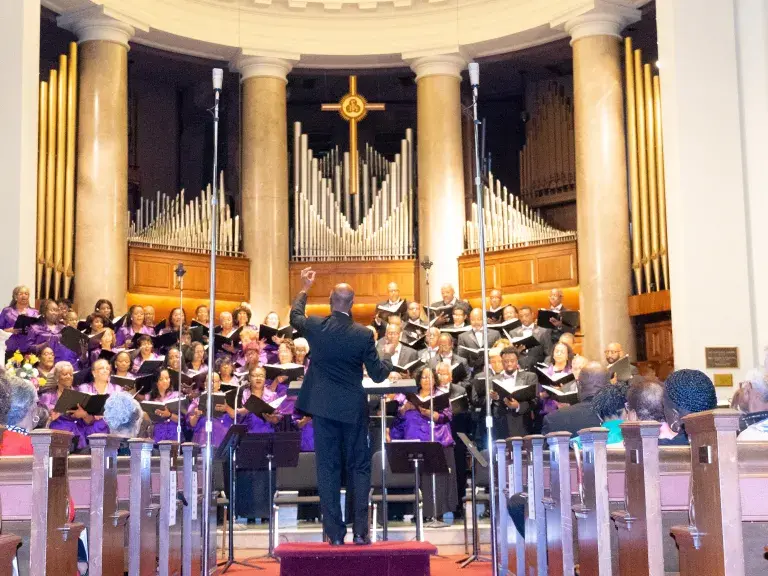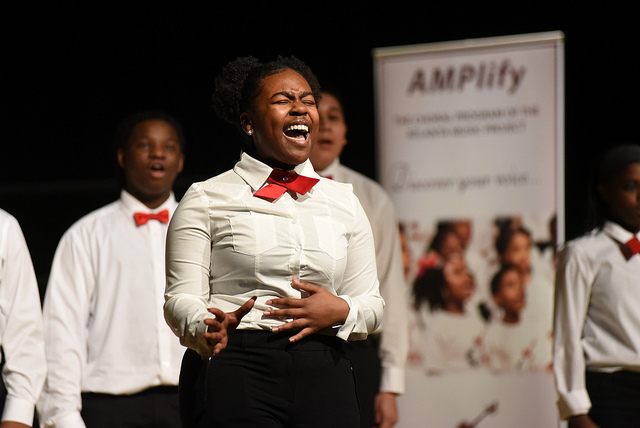
News stories about the women previously omitted from the history of classical music, databases that examine the gender breakdown of composers represented in orchestra seasons, and more female names included in concert programs—these signs are evidence of a growing interest in the voices of female composers. There is also a growing interest in going beyond the label of “female composer” to look more closely at the diverse points of view and nuanced perspectives represented within that term.
Chorus America recently spoke with two artistic leaders whose programming has focused specifically on African American female composers: Stanley Thurston, artistic director of the Heritage Signature Chorale, and Aisha Moody, the co-founder and director of AMPlify. The Washington DC-based Heritage Signature Chorale, an auditioned volunteer chorus committed to high-quality performances of African American choral music, presented a June 2018 concert entitled “Women’s Works.” AMPlify, the choral arm of the Atlanta Music Project, which provides intensive, tuition-free music education to underserved youth, paid tribute to female composers at its 2019 Black History Month concert.
These two very different organizations put together programs that look at the work of female composers through the lens of their specific missions and communities. But our conversations with Thurston and Moody, excerpted below, also reveal some common threads regarding the benefits of collaborating with composers and the excitement that this repertoire generated in their singers and audiences.
When did you first get the idea of doing concert programs that focused on African American female composers? How did the idea and the repertoire for these programs come together?
Stanley Thurston: Our “Women’s Works” program was a long time coming. I had been collecting works for a while, and had done some excerpts from some of the pieces over the last couple of years. We decided to add a living composers section to the program, and once we were able to get some of the composers to actually come and be present with us here in Washington DC, that solidified the whole thing.
One of the key pieces on the program was Undine Smith Moore’s Scenes from the Life of a Martyr. It’s a historical piece written back in the ‘70s, but it has not been performed a lot. This was a very intricate and extensive oratorio that she wrote when she was studying at Juilliard and it premiered at Carnegie Hall. We did not do all of it, of course, just excerpts. It was written in the memory of Martin Luther King, so that was very much of interest to us.
I was able to get my hands on the orchestra parts. And then Rosephanye Powell’s piece on the program was also orchestrated, and Evelyn Simpson-Curenton orchestrated hers, and Diedre Robinson orchestrated hers, so it all tied together with the musicians that we had on tap for this concert.
Aisha Moody: Every year for our black history month concert, we try to focus on black composers. This year, black female composers were the focus, but there was other repertoire. We work with students in grades 1-12, and it can be difficult to find choral literature that is the right fit for all those different ages, so we need to be flexible in our requirements.
The two conductors of our youth choir are both women, and this year they got together and decided that they wanted to focus on female composers. And both of them, without knowing, had chosen pieces by a locally based composer named Brittney Boykin. And I know Brittney!
When Brittney was a student at Spelman College, she worked with the Glee Club. Being a music major, she had an assignment for a theory or composition class to arrange a spiritual. So she arranged the spiritual “Go Down, Moses,” and the professor loved it so much that he gave it to the Spelman Glee Club to perform. That’s how she got started. So because I knew Brittney already, I contacted her and told her that she had to come and be our guest conductor.
What did being able to collaborate with some of the composers you were programming add to this experience?
ST: We were able to do a pre-concert lecture with four of the living composers that we programmed: Rosephanye Powell, Evelyn Simpson-Curenton, Ysaye Barnwell, and Diedre Robinson. They were there to talk about the pieces themselves. They were actually part of some of our rehearsals to let us know what their intentions were with the works.
To have the four of them together on the same panel talking with each other, it just added an amazing synergy to the whole atmosphere. And the next step was to hear how their work is inspiring younger composers—even Diedre for example, who is one of those younger composers. Since the performance, we’ve actually come to know a number of younger female composers. I think they heard about this event through social media and they have been reaching out since they now know that we do this kind of work.
AM: We’re dealing with little people in our program. We assume a lot of responsibility for shaping and molding their musical minds. They should know that there are people out there that look like them that are creating music, and it’s not just dead composers that we revere. The fact that we worked with a living composer that we could involve was really important to me.
AMPlify singers in performance
Brittney talked with them about her journey and about being a fulltime musician. I like to bring people in front of them to talk to them and say, “I am doing this music thing. It’s difficult and there are challenges, but I am doing it.” They see her on her way to get a Ph.D. and they can say to themselves, “I want to be like future Dr. Boykin.”
I know that being relevant is a concern for many of our ensembles. In order to be relevant, you have to reach out to the people who are there. You have to embrace the young people and include them. I hope that other organizations are reaching out to young composers.
What kind of response did you receive from your singers and audiences?
ST: The choir loved the event. A big part of what they liked about it was hearing the multi-dimensional performance with the orchestra. Those sections of the program really lit up the whole evening. Rosephanyne Powell’s orchestration had a little more percussive sort of African drum-like sound. Undine Smith Moore, coming out of Juilliard, it was very romantic writing—very intricate as far as the harmony she was using.
Of course, featuring women and female composers has been part of our national conversation over the last couple of years because it’s music that would not be often heard. To hear it at this level and point of complexity was something amazing to witness.
Our pre-concert discussion with the composers was amazingly popular. It was really a standing-room-only situation, which was kind of unusual. We found there was a real hunger for people to meet and hear directly from the composers.
We’re planning to do a “next in the series” of this kind of programming, probably in our 20th anniversary year. We’re already planning a sequel.
AM: Our February concert is our big show and people look forward to it every year. The response that we got this year was definitely overwhelming. We did pieces by Nina Simone, Dr. Rosephanye Powell, Sweet Honey in the Rock … these are groups that a lot of the adults in the audience are unfamiliar with, so it gives us joy to be able to expose them to new music also.
For our singers, of course, a choir is usually going to have more young ladies than gentlemen. That’s not as much of an issue for us, but those are the dynamics, so we have a whole girl-power energy going anyway. Our singers are young, but they know—especially our middle schoolers and high schoolers know—that women composers are not often celebrated in that way. They know that this is a little bit of a novel idea. So they were really excited.
Do you see performing this kind of repertoire as part of the mission of your organization?
ST: It’s part of the mission of the Heritage Signature Chorale to try to search out composers that represent all different facets of the African American diaspora of styles of singing and performance. A large part of what we do is historical research. This kind of music has been something that can be overlooked, often just because it’s not as readily available. You may have to dig a little deeper.
There’s so much more out there—more work from these composers that we already mentioned, and now more from these other, younger composers that we’re learning about. As we’re planning the next concert, we want to plan some more events around the research that goes into putting a program like this together.
AM: Before being a music organization, we’re a social change organization. We use music as a tool for social change. And that affects everything we do, and how we do everything we do, including picking music. We are dealing with communities that have not been given the same resources as other communities, and so we have a mindset of representing those who have been overlooked. That trickles over into the way that we look for repertoire.
We know that women are writing music and women are composing. We know that they don’t have the same platform that men do. We know there’s a disparity there. We don’t necessarily have to give a speech about it at our show, but our answer to that inequality is to go ahead and give that kind of music more of a platform. And we’re modeling that response for the kids in our program.
What suggestions do you have for other choral directors that are interested in learning more about the work of African American female composers? What resources would you point them toward?
ST: The historically black colleges and universities were of course where I first learned about a lot of these composers. I went to a historically black college for undergraduate. Certainly any of those college programs or a concert choir that has a history of doing that kind of material is a good place to start looking. Start an interaction with another music director who has done this kind of work.
I think we really do need to create some opportunities to talk about this repertoire more. The whole point is to get it out there and have more people singing it and experiencing it.
AM: When we were putting this concert together, we focused on resources that pointed to black composers, and then we would look to see where the women were on that list. You have to go to some less traditional resources. There are a few Facebook groups that I am a part of that highlight black composers and artists, and I scan those periodically for information.
Sometimes, because composers like this don’t receive the same exposure, we are duped into thinking that there is a lack. And there really isn’t. The artists are out there. You just have to open your eyes and look around you and be creative in your approach.


